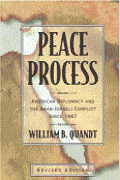In Gaza, the Golan Heights, and beyond, Israel faces multiple unfolding crises. On June 25, the Center for Middle East Policy at Brookings welcomed Member of the Israeli Knesset Yair Lapid for an Alan and Jane Batkin International Leaders Forum. During the discussion, a part of the center’s “Imagining Israel’s Future” series, Lapid presented his vision for Israeli policy in a turbulent time. Brookings President John Allen gave introductory remarks, and Senior Fellow Tamara Cofman Wittes moderated the conversation.
Lapid, formerly an author, journalist, and television presenter, founded the Yesh Atid party in 2012. Recent polls place Yesh Atid as the main opposition challenger to Prime Minister Benjamin Netanyahu’s Likud party.
Lapid addressed a range of topics over the course of the conversation. Notably, he called on the United States to recognize Israel’s sovereignty over the Golan Heights and discussed increasing partisanship in the U.S.-Israel relationship.
The peace process and Gaza
Wittes asked Lapid if he thought that present regional conditions allow for advancing the Israeli-Palestinian peace process.
“It is always better to be proactive,” Lapid said, arguing for renewed efforts toward a two-state outcome. “I think the fact that we saw this attrition of the relations between Israelis and Palestinians is the result of not doing anything on the peace process front.”
Asked to give his opinion on the Trump administration’s effort to formulate a peace plan, Lapid deferred, saying he could not do so without knowledge of the plan’s details. He described the 2014 peace negotiations as “tired people telling each other the same tiring things that they had for 20 years.” Against such a backdrop, he argued, “maybe a new or renewed point of view on this is the right thing to do.”
The conversation then turned to the ongoing crisis in Gaza, with Wittes noting the “troubling images and troubling outcomes” it has presented. Contending that Israel should work to address the area’s humanitarian needs, Lapid argued that “Israel is not to be blamed for what is happening in Gaza. Hamas is the only one to be blamed, but it doesn’t make it not our problem.”
The Golan Heights and Syria
Wittes then asked about the direction of American policy in Syria. The United States, Lapid proposed, should recognize Israeli sovereignty over the Golan Heights, the region captured by Israel from Syria in 1967 and viewed by most in the international community as key to any “land-for-peace” deal between the two countries.
Such American recognition would reassure Israelis at a time of Iranian encroachment in Syria, Lapid argued. Even those who would oppose such a move, he said, “have to admit to the fact that we cannot return the Golan Heights to [Syrian President Bashar al-Assad] who just killed half a million of his own people.”
Noting that the Syrian border had for decades been Israel’s most peaceful, Wittes asked if this idea might “make an Israeli confrontation with Iran, or the Syrian regime, or militias in Syria more likely.”
Lapid responded that his proposal gave the United States a chance to punish the Syrian government for its conduct. Stating that “the bad guys won the [Syrian civil] war because the world let them win the war,” he argued that his plan allowed the United States to show that “there is a punishment for a crime.”
Wittes then asked Lapid if, were he to become prime minister, he would allow Syrians fleeing violence to enter Israel. “Israel cannot afford to have an open border with countries we have a war with,” he said, arguing that while Israel must address its security concerns, it had done its best to contribute to alleviating the refugee crisis.
The U.S.-Israel relationship
Wittes next asked for Lapid’s view of “what’s working and what’s not” in the U.S.-Israel relationship. He noted that American support for Israel has long been bipartisan, saying that “everybody throughout Israeli political history was very keen on making sure this stays a bipartisan issue.”
Now, though, Lapid observed that “there is anger within the Democratic party that we cannot ignore.” Noting his appreciation for “the kind of friendship and even warmth the current president has shown to Israel,” Lapid called the prospect of Israel becoming a partisan issue in American politics “disastrous.” He stated that Americans could elect a Democratic majority in the Senate as soon as November, and that “two years from now, we might have [President Trump] for another term, but we might have a Democratic president. And these are going to be Democrats with a lot of bad memories.”
Israeli domestic politics
Wittes then pointed out that recent polls have placed Lapid’s Yesh Atid party in a strong position, but still well behind Benjamin Netanyahu’s governing Likud party. Lapid argued that this is a time of strong movement in Israeli politics, describing the polls as “shaking,” and saying that they “will shake all the way to the elections.”
These elections, he proposed, will be about “the spirit of the nation.” He said that the 2013 elections were about the economy, and those in 2015 hinged on security. The coming elections, he argued, would be decided on questions such as “What kind of Israel do we want?” Wittes asked for his own answers to this question.
“We have to be a Western democracy: vibrant, vital, smart, technological, totally pro-globalization,” Lapid said, “and optimistic in terms of our ability to do something about those things that our current government is just saying, you know, ‘It is very tough.’”
“What we need now is a government which thinks its job is not to eloquently describe the problems we have but go out there and solve them,” he concluded.






Commentary
An alternative vision for Israel
July 3, 2018